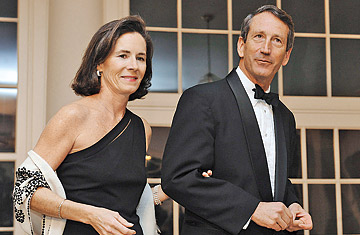
South Carolina Governor Mark Sanford arrives with his wife Jenny at a White House dinner held by President Obama for the National Governors Association on Feb. 22, 2009
(5 of 7)
Poignantly, the one thing that unites the poor and the middle class in their hopes for family life is the imperishable dream of being married forever, grabbing hold of the golden ring of lasting partnership. The low-income mothers studied by Kefalas and co-author Kathryn Edin spoke repeatedly of their wish to get married; they "cherish marriage and hold it to an impossibly high standard," the authors found, but too often forgo it as a result. Meanwhile, the middle class has spent the past 2½ decades--during which the divorce culture became a fact of life--turning weddings into overwrought exercises in consumer spending, as if by just plunking down enough cash for the flower girls' dresses and tissue-lined envelopes for the RSVP cards, we can somehow improve our chance of going the distance. Think of the touching moments on Inauguration Night, when at ball after ball, crowds of young people swooned at the sight of Barack and Michelle Obama dancing together, artlessly but sincerely and clearly with great affection. They are an immensely appealing couple, and it was a historic night, but what we saw reflected in the faces of those awed young people--and in the country's insatiable appetite for photographs of the First Family's private life--was wonder at the sight of a middle-aged man and woman still together, still in love.
We want something like that for ourselves; we recognize that it is something of great worth, but we are increasingly less willing to put in the hard work and personal sacrifice to get there. The Obamas, for example, are enjoying their time of family closeness after almost two years of enforced separation, an interlude that would have caused many less committed couples to turn in their cards and give up. A lasting marriage is the reward, usually, of hard work and self-sacrifice.
The Ballad of Jon and Kate
Last summer, I had an opportunity to find out how meaningful the "in sickness and in health" clause of the marriage vows is when I underwent six rounds of chemotherapy, during which my husband treated me with great kindness. I began strong, making it to the dinner table every night and putting up a brave front for our children. But chemo, she will beat you down. I spent the last week on a friend's bedroom floor, heavily drugged, mildly nauseated and watching Jon & Kate Plus 8.
Ideal viewing conditions, as it turns out. I grew fond of the titular characters, in particular Kate, who seemed to stand like a colossus over their Pennsylvania tract home, constantly corralling and cajoling her uncountable--and, to the layperson, indistinguishable--children into doing relatively simple things, each of which became a hellish exercise in the improbable simply because of the logistics. Sixteen little shoes had to be found and tied before the family could even leave the house. That they weren't a pack of barefoot shut-ins was a testament to Kate's indomitable will.
